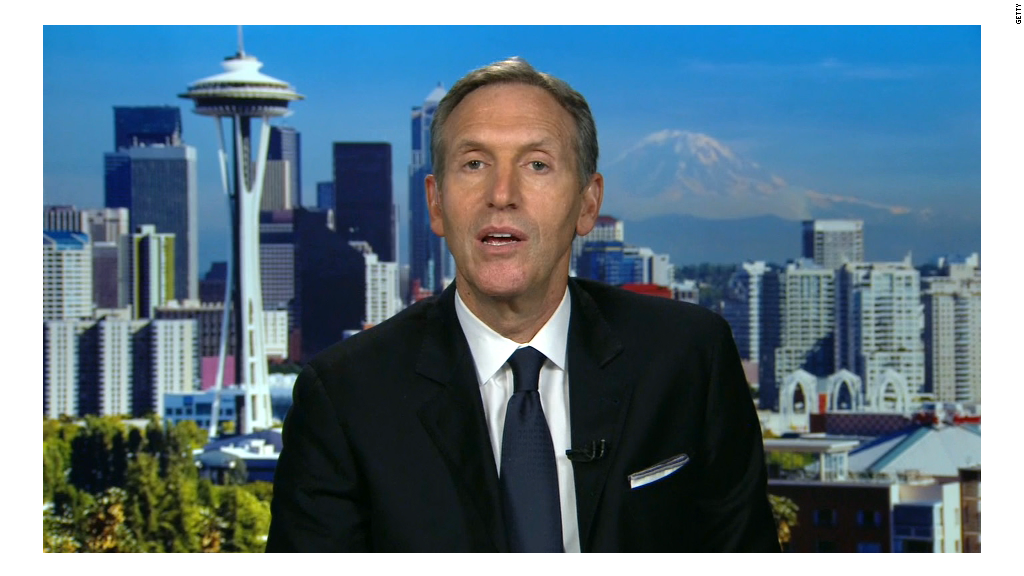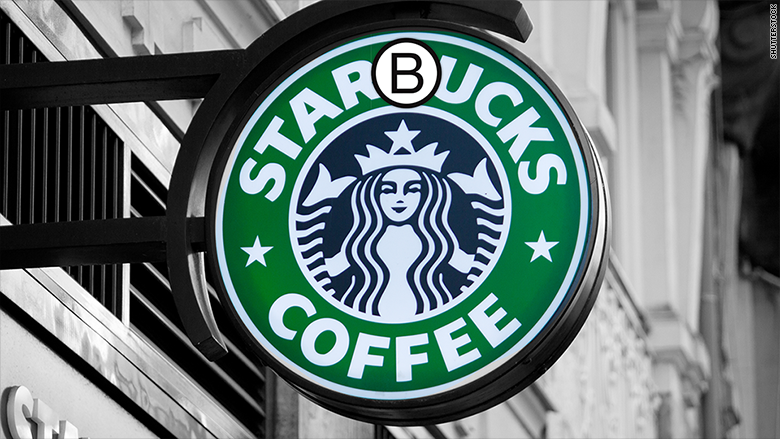
Starbucks wants to sell a gajillion lattes and Frappuccinos. But it also wants to make the world a better place. What's wrong with that exactly?
Yes, the company has come under fire on social media for its recent #RaceTogether initiative.
Customers understandably may not want to discuss the touchy issue with their friendly barista while waiting in line for their venti chai tea with almond milk.
It's almost like that Nationwide dead kid commercial during the Super Bowl. The message (trying to prevent household accidents) was admirable, but it was a PR blunder to air it up against comedic ads for beer and snacks. It just wasn't the right time or place.
Still, should anyone be surprised that Starbucks (SBUX) CEO Howard Schultz wants to start a conversation?
Related: Schultz says #RaceTogether is 'right thing to do'
The company has been an unabashed supporter of same sex marriage, asked customers to leave their guns at home and also urged lawmakers to end gridlock in Washington by asking baristas to write "Come Together" on cups.

So here's my humble suggestion for Schultz and Starbucks. Fully embrace the whole do-gooder image by applying to become a certified B Corporation -- a company that specifically aspires to make a difference from a social and environmental perspective.
Doing so would make social initiatives a legal part of its decision-making process.
Starbucks would be the biggest B Corp by far if it chose to go that route. It would need to meet the standards required by the non-profit company B Lab, which officially hands out the B Corp designations.
But Starbucks would not be the first publicly traded firm in this growing movement. Online marketplace Etsy (ETSY), which has filed for an initial public offering, is a B Corp.
Natura, a Latin American cosmetics company that is publicly traded in Brazil, became a B Corp last year.
Related: How Etsy's IPO could save cities
Two other private companies that have generated a lot of IPO buzz -- online eyeglass store Warby Parker and The Honest Co., the maker of organic/eco-friendly baby products co-founded by actress Jessica Alba -- are also B Corps.
And some big public companies have subsidiaries which are B Corps. Campbell Soup (CPB), for example, owns Plum Organics.
The most famous example of all is probably Unilever (UL), which is the parent company of Ben & Jerry's -- the ice cream maker known as much for its socially responsible practices as its wacky flavors like Chunky Monkey and Cherry Garcia.
Unilever's CEO even suggested to The Guardian earlier this year that the company has thought about becoming a B Corp.
Will Starbucks be next? The company declined to comment.
But I think Starbucks could win more raves from the large group of customers who aren't complaining about #RaceTogether by going the extra mile and trying to become a B Corp.
"It's more important than ever for companies to develop strong emotional connections with their customers," said Kevin Paul Scott, co-founder of ADDO Worldwide, a brand consulting firm. "Passionate Starbucks customers may become even bigger fans of the company. They will want to do more business with a company that shares their values."
Related: Starbucks exec back on Twitter after #RaceTogether uproar
Sure, it's debatable how much of a benefit Starbucks would get from trying to become a B Corp. It would mainly be a marketing badge of honor -- kind of like getting a Fair Trade label designation.
But there is arguably little downside as well.
Starbucks has already proven that its social efforts are not a problem for investors or customers. Despite the recent backlash to #RaceTogether on Twitter and Facebook, the stock is at an all-time high.


